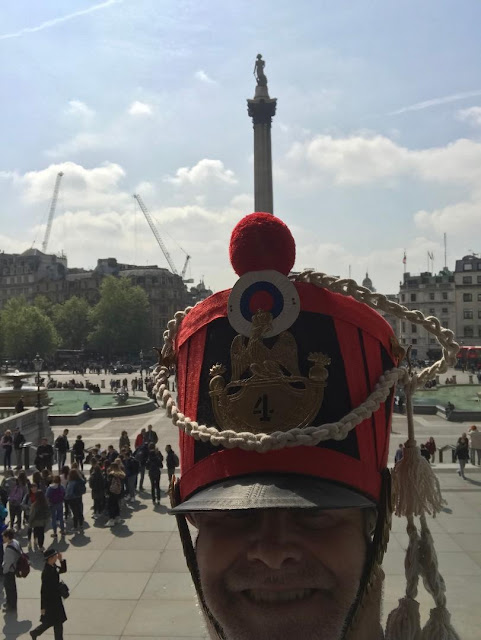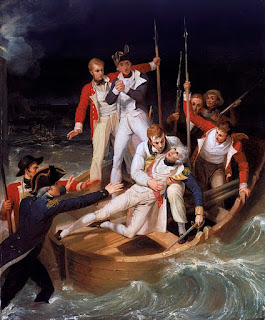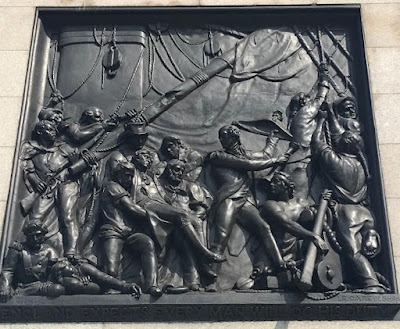SPOILER ALERT: Contains Info from Avengers Endgame and Episode 3 of the 8th season of Game of Thrones. If you don't wish to know plot details stop reading!
This past weekend movie-goers around the world spent $1.2 billion on tickets to see Avengers: Endgame in theaters (edition.cnn.com/2019/04/27/media/avengers-endgame-box-office-global-record/index.html). This past week somewhere around a billion people around the world will watch the Battle of Winterfell -- the third episode of the final season of Game of Thrones (www.dailymail.co.uk/news/article-6895775/Game-Thrones-set-one-billion-viewers-worldwide-final-series-airs-week.html). Both the film and the television episode featured messianic warriors named Stark. Tony Stark (AKA Ironman), created a time machine and sacrificed himself in order to save the lives of billions and defeat Thanos in the Marvel Cinematic Universe (MCU). Arya Stark, the young assassin played by the English actress Maisie Williams, managed to shank the Night King in his icy heart, thereby destroying his army of undead White Walkers.
In the dark times in which we live (Notre Dame burnt, Christians slaughtered in Sri Lanka on Easter Sunday, etc.) there is clearly a need for escape which is satisfied, in part, by blockbuster fantasy entertainment. Heroic characters such as Tony and Arya Stark provide us with some measure of relief from our daily lives. But, a the end of the day, they are merely fictional characters.
Linguistically, Tony and Arya's surname binds by a common Germanic root. The word "Stark" means strong or strongly in German. Ironman, without doubt, is an incredibly strong character. Despite her youth and diminutive frame the young Arya, wielding her sharp needle, is a strong character too. But, a the end of the day, they are merely fictional characters.
Are there real historical figures that could have inspired the stories that unfold in Avengers and GOT? Is there a kernel of fact behind the popular fictions that entertain us?
I would submit the life of Horatio Nelson as the strong Messianic Warrior par excellence. Nelson was born in 1758, the 6th out of eleven children -- the son of a Methodist minister. He grew up in Burnham Thorpe in Norfolk, a small town far from London. He did not attend university or even high school. At the age of twelve (two years prior to Maisie Williams' age when she joined the cast of Game of Thrones) he joined his uncle's ship in the Royal Navy. The sea and the navy were his university. He journeyed far afield visiting the Arctic and India. His first significant combat experience took place in the Caribbean during the American Revolution. Nelson's Landing can be found today in Antigua.
 |
| Arya Stark (Maisie Williams) |
At 5'4" Lord Nelson stood a bit taller than Maisie Williams (5'1") and a bit shorter than Robert Downey Jr. (5'8").
 |
| Ironman (Robert Downey Jr.) |
After the outbreak of the French Revolution in 1789, England would be at war with France for most the the next 26 years. The Royal Navy played a tremendous role in fighting the French and Napoleon and Nelson was their greatest leader. In 1797 Nelson experienced a rare defeat at the Battle of Santa Cruz de Tenerife where he was wounded by a Spanish canon ball and lost his right arm. At the Battle of the Nile in 1798 Nelson smashed the fleet that had transported Napoleon's army to Egypt marooning him in the desert. At Copenhagen in 1800 Nelson turned a blind eye to commanding officer's order to withdraw and won a victory over the Danes.
 |
| Commander Kelly at Trafalgar Square, London Many troops of La Grande Armée wore similar shakos |
In the summer of 1805 Napoleon commanded the greatest army in Europe. About 60,000 soldiers of La Grande Armée were encamped at Boulogne -- around twenty miles from the English coast. Only the moat of the English Channel stood between Napoleon and a conquest of Britain. Napoleon, however, had no Infinity stones. The French soldiers may not have been White Walkers with supernatural powers but they were an existential threat to the British Crown and British liberty. Had Napoleon managed to cross the channel his army would almost certainly have defeated the puny British army and captured London.
 |
| Horatio Nelson wounded at Santa Cruz de Teneriffe |
All that stood in Napoleon's way was the Royal Navy. And, of course, Horatio Nelson.
On October 21, 1805 the British fleet, led by Nelson, defeated the Franco-Spanish fleet led by Admiral Villeneuve. The Battle of Trafalgar was a decisive British victory where they captured 21 enemy ships. The butcher's bill, however, included Nelson himself who had been shot by a French soldier from the rigging of the Redoutable. Nelson's funeral in St. Paul's cathedral in January 1806 was the greatest outpouring of public grief in England until the death of lady Diana in 1997.
Nelson's victory gave the British naval supremacy not merely for the duration of the Napoleonic Wars but for a century. Trafalgar was not simply a victory for British liberty -- it was a victory for human liberty around the world. A year after Trafalgar the British crown outlawed the slave trade -- a move that they would have been unable to enforce without Nelson's victory.
 |
| Nelson's death, Trafalgar Square Note African sailor on left |
The plaque depicting Nelson's death that can be found at Trafalgar Square in London features an African sailor. African sailors did serve on board the HMS Victory that day. Moreover, a South African child born in 1918 would later be christened "Nelson" in honor of the great admiral. He would grow up to become Nelson Mandela.
Perhaps the greatest compliment ever paid to Nelson came from Napoleon himself. After the Battle of Trafalgar he ordered all ships of the French Navy to display this sign: La France compte que chacun fera son devoir -- France expects that every man will do his duty.
The heroic aura of Nelson has been exploited by film makers many times. In 1941 That Hamilton Woman, produced and directed by Alexander Korda, was a hit that became Winston Churchill''s favorite film. In 2015 the Disney company paid 24,000 pounds to have a light saber projected onto Nelson's column to promote a new Star Wars film.
Enjoy the escape that fantasy entertainment provides but don't forget the historical reality that inspires all great fiction. Enjoy Black Panther but remember Nelson Mandela and Horatio Nelson too!
You can find signed copies of our books at
these web sites...
Or regular copies on Amazon...
Or on Kindle...
Listen to my interview with Bob Cudmore...http://bobcudmore.com/thehistorians/tracks/ChristopherKelly(August2017)(29)(mp3).mp3
And my interview...www.thebook-club.com/blog/bookshelf-interview-with-christopher-kelly
And my most recent interview...http://www.wbur.org/hereandnow/2018/08/17/america-invaded-christopher-kelly


No comments:
Post a Comment